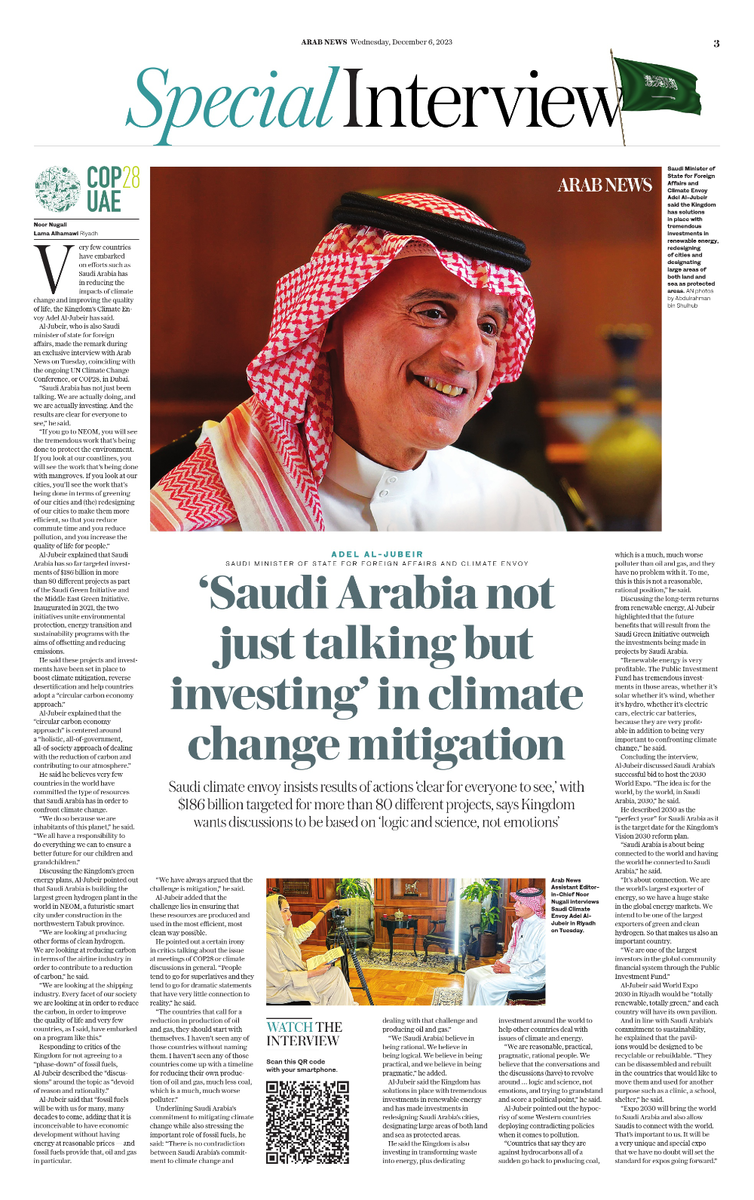RIYADH: Very few countries have embarked on efforts such as Saudi Arabia has in reducing the impacts of climate change and improving the quality of life, the Kingdom’s Climate Envoy Adel Al-Jubeir has said.
Al-Jubeir, who is also Saudi minister of state for foreign affairs, made the remark during an exclusive interview with Arab News on Tuesday, coinciding with the ongoing UN Climate Change Conference, or COP28, in Dubai.
“Saudi Arabia has not just been talking. We are actually doing, and we are actually investing. And the results are clear for everyone to see,” he said.
“If you go to NEOM, you will see the tremendous work that’s being done to protect the environment. If you look at our coastlines, you will see the work that’s being done with mangroves.
“If you look at our cities, you’ll see the work that’s being done in terms of greening of our cities and (the) redesigning of our cities to make them more efficient, so that you reduce commute time and you reduce pollution, and you increase the quality of life for people.”
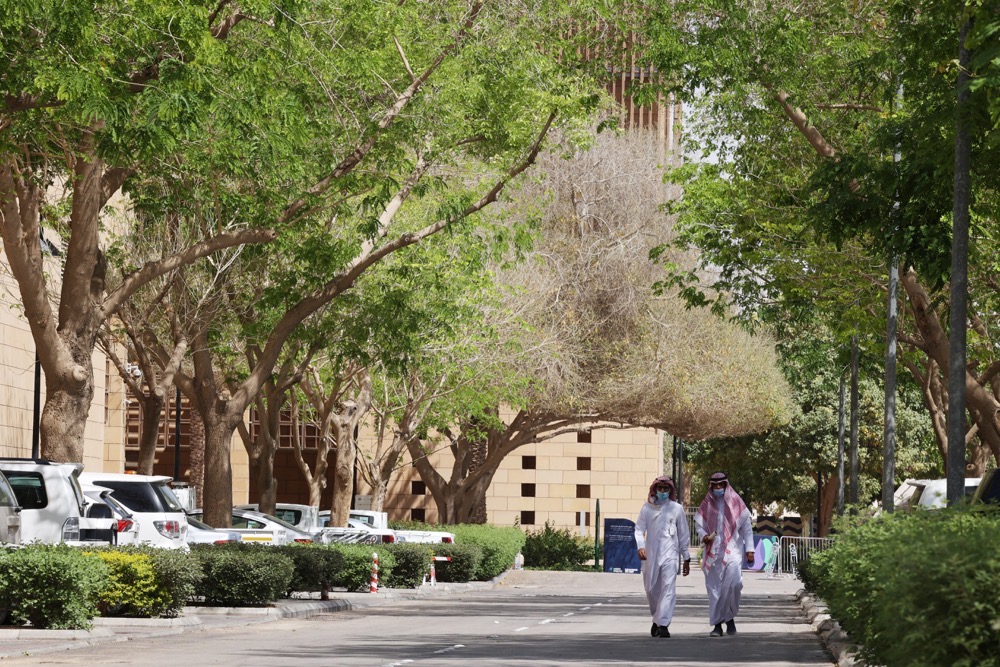
“There is no contradiction between Saudi Arabia’s commitment to climate change and dealing with that challenge and producing oil and gas,” Al-Jubeir told Arab News. (AFP)
Al-Jubeir explained that Saudi Arabia has so far targeted investments of $186 billion in more than 80 different projects as part of the Saudi Green Initiative and the Middle East Green Initiative. Inaugurated in 2021, the two initiatives unite environmental protection, energy transition and sustainability programs with the aims of offsetting and reducing emissions.
He said these projects and investments have been set in place to boost climate mitigation, reverse desertification and help countries adopt a “circular carbon economy approach.”
Al-Jubeir explained that the “circular carbon economy approach” is centered around a “holistic, all-of-government, all-of-society approach of dealing with the reduction of carbon and contributing to our atmosphere.”
He said he believes very few countries in the world have committed the type of resources that Saudi Arabia has in order to confront climate change.
“We do so because we are inhabitants of this planet,” he said. “We all have a responsibility to do everything we can to ensure a better future for our children and grandchildren.”
Discussing the Kingdom’s green energy plans, Al-Jubeir pointed out that Saudi Arabia is building the largest green hydrogen plant in the world in NEOM, a futuristic smart city under construction in the northwestern Tabuk province.
“We are looking at producing other forms of clean hydrogen. We are looking at reducing carbon in terms of the airline industry in order to contribute to a reduction of carbon,” he said.
“We are looking at the shipping industry. Every facet of our society we are looking at in order to reduce the carbon, in order to improve the quality of life and very few countries, as I said, have embarked on a program like this.”
Responding to critics of the Kingdom for not agreeing to a “phase-down” of fossil fuels, Al-Jubeir described the “discussions” around the topic as “devoid of reason and rationality.”
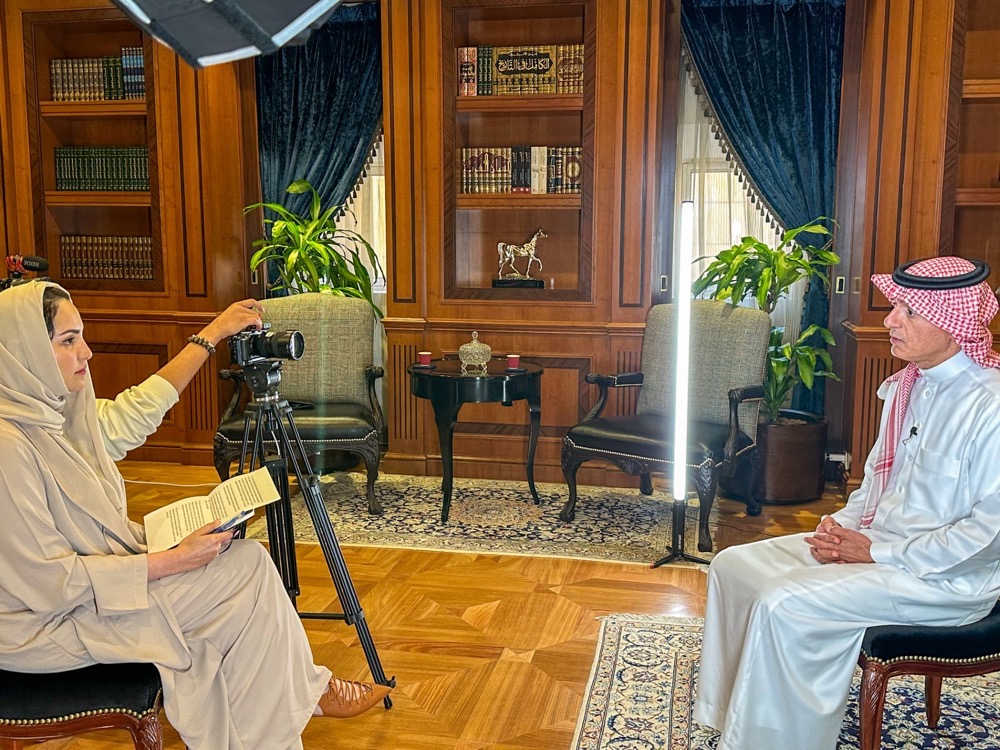
The minister talking to Arab News’ Noor Nugali. (AN photo/Abdulrahman bin Shulhub )
Al-Jubeir said that “fossil fuels will be with us for many, many decades to come, adding that it is inconceivable to have economic development without having energy at reasonable prices — and fossil fuels provide that, oil and gas in particular.
“We have always argued that the challenge is mitigation,” he said.
Al-Jubeir added that the challenge lies in ensuring that these resources are produced and used in the most efficient, most clean way possible.
He pointed out a certain irony in critics talking about the issue at meetings of COP28 or climate discussions in general. “People tend to go for superlatives and they tend to go for dramatic statements that have very little connection to reality,” he said.
“The countries that call for a reduction in production of oil and gas, they should start with themselves. I haven’t seen any of those countries without naming them. I haven’t seen any of those countries come up with a timeline for reducing their own production of oil and gas, much less coal, which is a much, much worse polluter.”
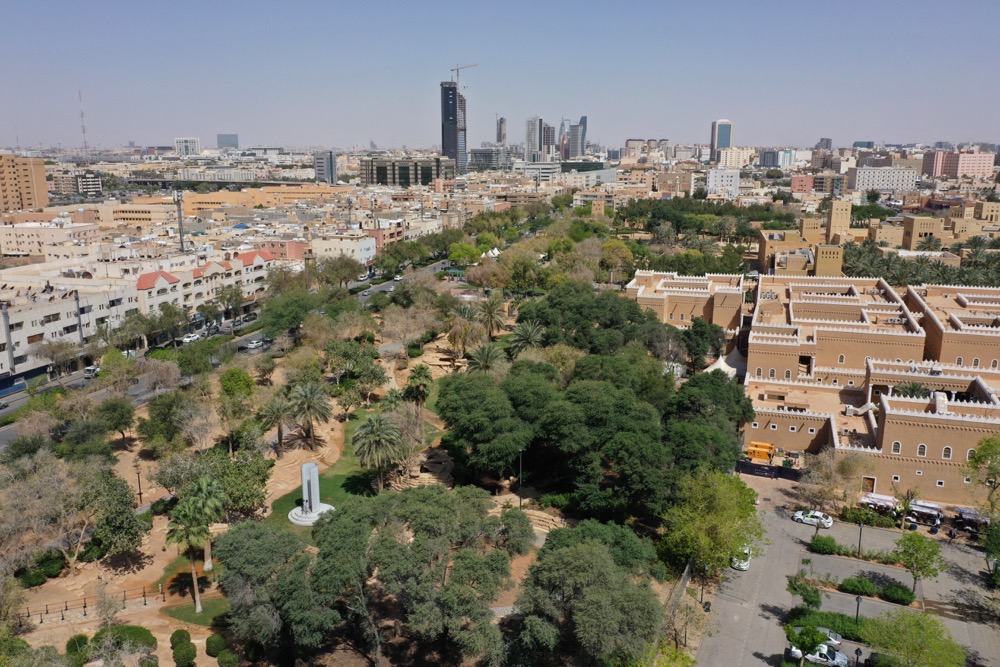
Al-Jubeir explained that Saudi Arabia has so far targeted investments of $186 billion in more than 80 different projects. (AFP)
Underlining Saudi Arabia’s commitment to mitigating climate change while also stressing the important role of fossil fuels, he said: “There is no contradiction between Saudi Arabia’s commitment to climate change and dealing with that challenge and producing oil and gas.”
“We (Saudi Arabia) believe in being rational. We believe in being logical. We believe in being practical, and we believe in being pragmatic,” he added.
Al-Jubeir said the Kingdom has solutions in place with tremendous investments in renewable energy and has made investments in redesigning Saudi Arabia’s cities, designating large areas of both land and sea as protected areas.
He said the Kingdom is also investing in transforming waste into energy, plus dedicating investment around the world to help other countries deal with issues of climate and energy.
“We are reasonable, practical, pragmatic, rational people. We believe that the conversations and the discussions (have) to revolve around … logic and science, not emotions, and trying to grandstand and score a political point,” he said.
Al-Jubeir pointed out the hypocrisy of some Western countries deploying contradicting policies when it comes to pollution.
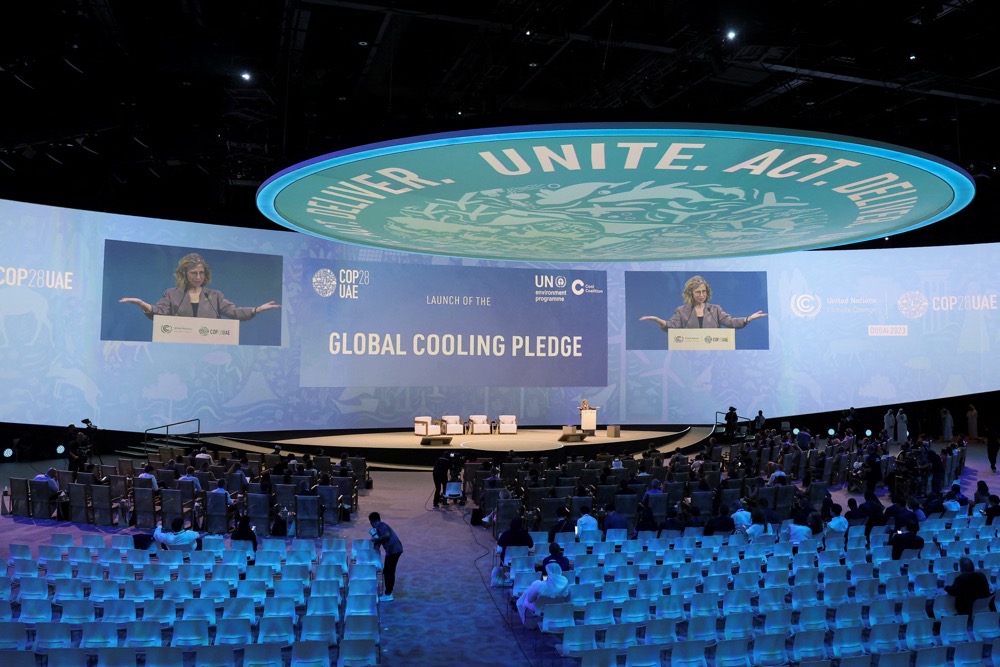
Al-Jubeir spoke to Arab News as the UN Climate Change Conference, or COP28, is hosted in Dubai. (Reuters)
“Countries that say they are against hydrocarbons all of a sudden go back to producing coal, which is a much, much worse polluter than oil and gas, and they have no problem with it. To me, this is this is not a reasonable, rational position,” he said.
Discussing the long-term returns from renewable energy, Al-Jubeir highlighted that the future benefits that will result from the Saudi Green Initiative outweigh the investments being made in projects by Saudi Arabia.
“Renewable energy is very profitable. The Public Investment Fund has tremendous investments in those areas, whether it’s solar whether it’s wind, whether it’s hydro, whether it’s electric cars, electric car batteries, because they are very profitable in addition to being very important to confronting climate change,” he said.
Concluding the interview, Al-Jubeir discussed Saudi Arabia’s successful bid to host the 2030 World Expo. “The idea is: for the world, by the world, in Saudi Arabia, 2030,” he said.
He described 2030 as the “perfect year” for Saudi Arabia as it is the target date for the Kingdom’s Vision 2030 reform plan.
“Saudi Arabia is about being connected to the world and having the world be connected to Saudi Arabia,” he said.
“It’s about connection. We are the world’s largest exporter of energy, so we have a huge stake in the global energy markets. We intend to be one of the largest exporters of green and clean hydrogen. So that makes us also an important country.
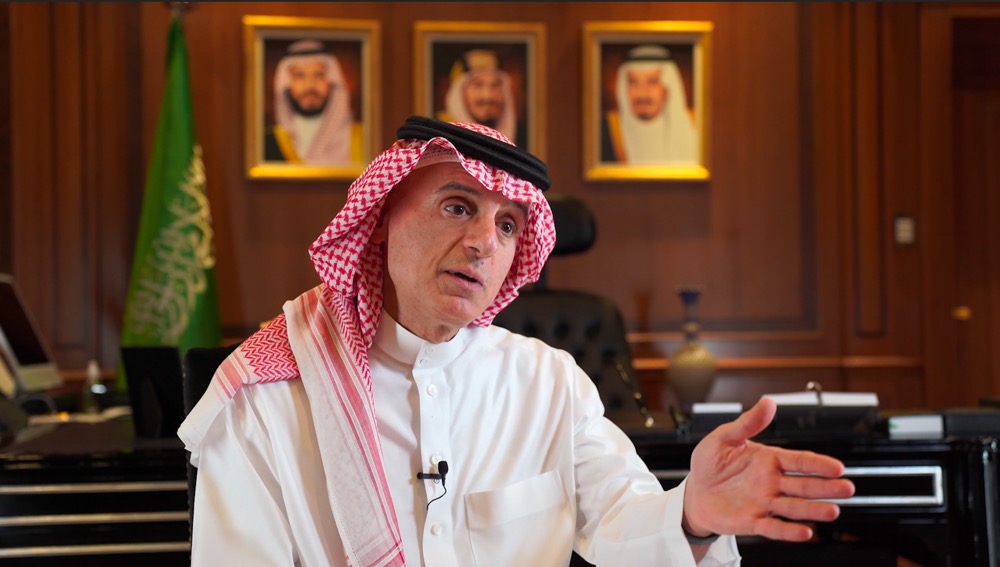
“Saudi Arabia has not just been talking. We are actually doing, and we are actually investing. And the results are clear for everyone to see,” Al-Jubeir said. (AN photo/Abdulrahman bin Shulhub )
“We are one of the largest investors in the global community financial system through the Public Investment Fund.”
Al-Jubeir said World Expo 2030 in Riyadh would be “totally renewable, totally green,” and each country will have its own pavilion.
And in line with Saudi Arabia’s commitment to sustainability, he explained that the pavilions would be designed to be recyclable or rebuildable. “They can be disassembled and rebuilt in the countries that would like to move them and used for another purpose such as a clinic, a school, shelter,” he said.
“Expo 2030 will bring the world to Saudi Arabia and also allow Saudis to connect with the world. That’s important to us. It will be a very unique and special expo that we have no doubt will set the standard for expos going forward.”
